How often have you heard a company say, “Employees are our greatest asset”? It is a favorite saying in the business world and one that Marcus Lemonis emphasizes at every opportunity. “The customer is not No. 1 to me,” he said. “They’re No. 2 – right behind the employee.”
But all too often the actions of a business fail to match those fine words. Rather than look at themselves, owners blame their employees for the problems they encounter in business or fail to invest in their human assets. When Marcus met the owner of a California dog grooming and boarding business several years ago, he found several competent employees were on the verge of quitting. They told Marcus they were tired of being criticized for their actions, while their suggestions for improvement were ignored. Later, the owner of the pet business agreed, saying he most enjoyed being with the dogs.
But whether or not you are a “people person,” you can take steps to improve your relationship with your employees. It doesn’t require a big financial investment or time commitment. Instead, it’s a matter of maintaining a positive attitude in the face of the challenges facing every business. As Mary Kay Ash, founder of Mary Kay Cosmetics, once said, “People are definitely a company’s greatest asset. It doesn’t make any difference whether the product is cars or cosmetics. A company is only as good as the people it keeps.”
Employees are Assets
Successful businesses rely on several different types of assets, such as financial capital, real estate, production equipment and powerful technology. But in today’s knowledge-based economy, there is no question that employees are the most important asset of an organization.

Fortunately, many business owners, as well as leaders of Fortune 500 companies, understand that their people are their greatest asset. In 2019, Hilton ranked #1 on Fortune magazine’s ‘100 Best Companies to Work For®’ list. “Hilton truly has hospitality at its core, resulting in a unique team member and guest focus that is unlike any other company I have seen,” said one employee. “The company invests in me and my team, and encourages an entrepreneurial approach to our work.”
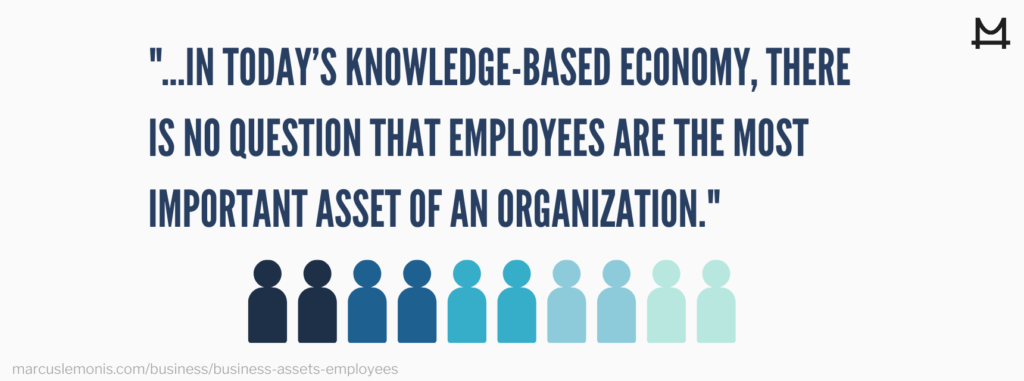
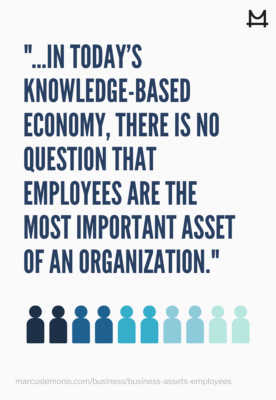
Employees at Forbes’s #2 ranked company, Salesforce, had similar things to say. “They truly care about empowering employees and improving the entire community in which we are involved,” said one. “Many places talk, but Salesforce backs up that talk with even more action. I am proud to tell people where I work and how much they give back.”
But not everyone understands that employees are the most important asset of an organization. There are plenty of smaller businesses with a different perspective, such as an Illinois-based sports apparel company that specializes in fishing apparel. Not long ago, Marcus met with the co-owners who combined their first names and built a multi-million dollar company with more than 20 employees. While Marcus was hoping to turn the company into a major player in the sports apparel market, he quickly changed his outlook after talking with several employees. They told him they were tired of working in a warehouse without air-conditioning – especially when the two owners left every Friday to go fishing. Even worse, they knew the company was in trouble and cashed their paychecks as quickly as possible, fearing they would bounce. Although the owners would say people are our greatest asset, the reality was very different.

6 Ways Employees are your Greatest Asset
Just in case you may not be clear that employees are assets, rather than liabilities, here are six ways they contribute to the success of your business.
- Employees are essential to providing your goods or services. Step back for a moment and consider how long you could keep your business running if you had to make sales calls, produce your goods or services, support your customers and collect the payments all by yourself. Unless you are a sole practitioner, you need to hire good employees, train them, and motivate them to keep your business running
At a specialty cheese shop in New York, Marcus recognized the talent and dedication of a particular long-time employee to the family business. Marcus put the employee in charge of developing a complementary product line, including cheese knives and boards, and wound up making him a partner in the business.
- Employees will help you recruit new talent. When someone is looking for work, they often check online reviews and ratings of their target companies. If your employees are satisfied with how you treat them, they will typically give you good grades in these online sites. In addition, they may know good people in your community who are looking for a better position in sales, operations, accounting or some other field. This kind of word-of-mouth recruiting from employees who know that you believe “people are our most important asset” can be a very cost-effective way for you to recruit new talent.

- Employees are your first customers. If you want to treat your customers well, you need to believe that your employees are assets. In many ways, they are the first customers for your business – and if you can’t provide them with a satisfying employee experience, your customers will know right away. Take the case of a full-service salon company in New York. The owner started the business in 1998 and grew it to a $4.1 million operation with more than 120 employees in four locations. Marcus felt the family-owned company could benefit from his expertise as well as his investment dollars.
When he toured the first salon, Marcus found it looked dated and run-down.
In fact, the owner told him she was having trouble finding new hairdressers because the premises were in poor condition. Another issue related to management: several employees felt their duties were unclear and the products they needed were always in short supply. After implementing Marcus’s recommendations – including a change in management and physical renovations– employee morale improved and the salon’s revenue and profitability increased significantly.

- Employees can give their 100% to your business. Well-trained, experienced and motivated employees can deliver an exceptional customer experience that makes your business stand out from the competition. They can also help you develop new product and service lines, reach your sales targets and contribute to your community service initiatives.To take just one example, Trader Joe’s clearly understands that highly engaged employees are the most important asset of the organization. As a recent Forbes article noted, “Trader Joe’s excels at quick response times and employees who will do anything – even opening products to give samples – to make customers happy.”
- Employees are the face of a business. Who provides the day-to-day customer experience for your business? It is your employees on the front lines who serve as the face of your business. If they come to work feeling great, they will perform their jobs well and convey their positive feelings to your customers – a win-win outcome for all aspects of your business.
- Retaining great employees strengthens your long-term prospects. Turnover is the bane of many small businesses. It takes time and money to replace workers who leave your organization. But if you believe that “people are our greatest asset,” then you have laid the foundation for a talent retention strategy to support your operations in the years ahead. After all, experienced employees who know your customers understand your culture and appreciate their careers will keep you on the right track for the years ahead.
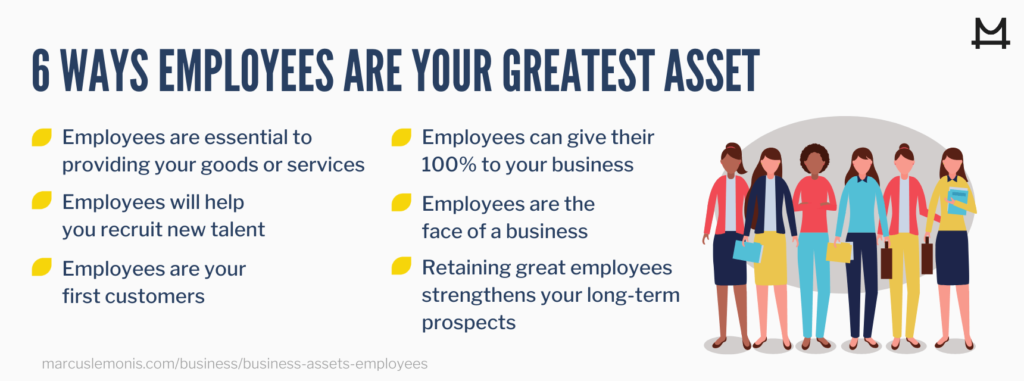
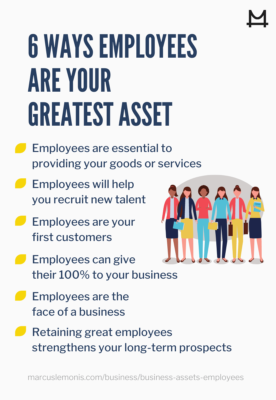
Let Employees Know Their Value
Here are four tips for treating your employees well, improving their performance and demonstrating that you know that people are your greatest asset.
- Empower your employees. Most people resent being micromanaged. Rather than spelling out each task in detail, allow your employees to find their own solutions to the issues they face on the job. Let them make decisions, and help them learn from the results, even if they make mistakes.
- Show them respect. Don’t talk down to your employees, belittle their skills or insist they put in extra hours without compensation. Instead, treat every individual with respect, regardless of personality, education, gender, age or cultural background.

- Recognize and reward their achievements. When employees do a great job, make sure to let them know you appreciate their contributions. People who feel valued will tell family, friends and customers about how much they like working for you – and that spirit can spread quickly throughout your organization.
- Give them opportunities to grow. Don’t be afraid to challenge your employees by giving them assignments that stretch their capabilities and add to their skills. This is an excellent way to keep them engaged in the business and to increase the value of your people assets.
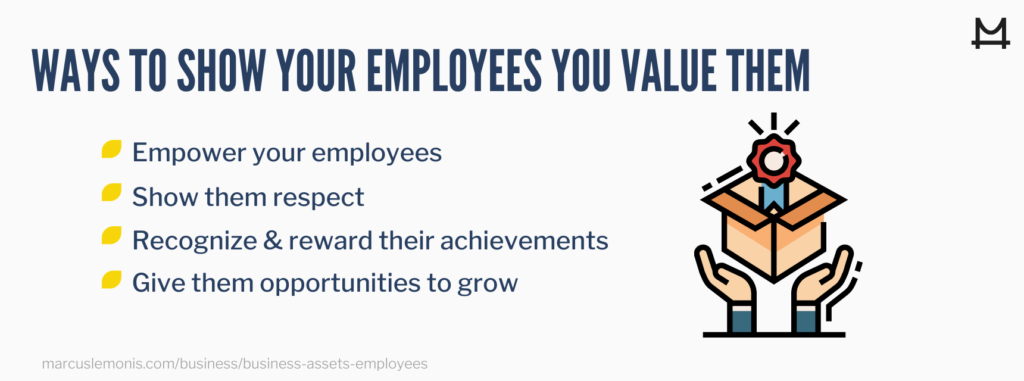
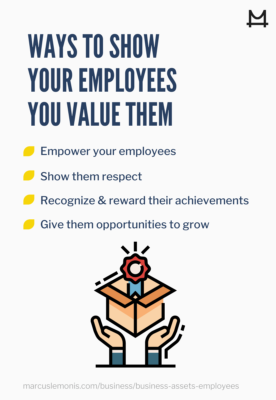
As Marcus says, the three keys to business success in today’s world are people, process and product. All three aspects of your operations need to be in alignment to maximize your long-term profitability. But it’s clear that people come first, because employees are the most important asset of an organization.
- How are you treating your most important asset, your employees?
- What ways can you improve this treatment?





